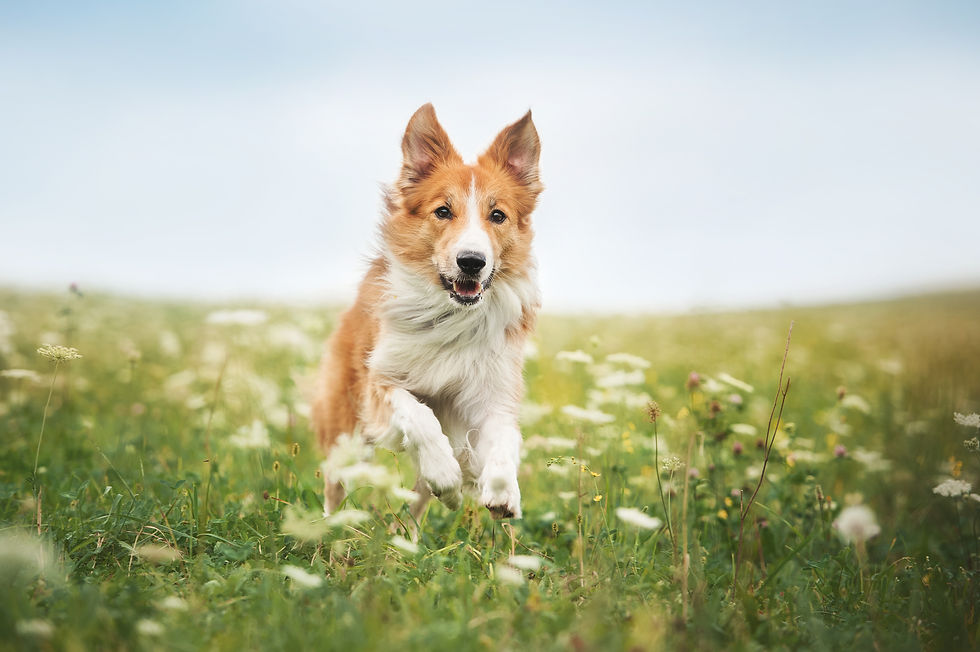Quieting Down So Your Dog Can Listen
- Saralyn Wallace, CPDT-KA
- Oct 28, 2020
- 3 min read

I hear you! "How does that make sense?!" Don't worry-I'll explain.
If there is one thing that each of my clients have in common, it is that they spend a whole lot of time talking to (or yelling at) their dogs and getting nothing accomplished. The reasons why their dogs are seemingly "ignoring" them often vary, but the owners' actions remain the same: yelling or saying the same "commands" to their dogs over and over, escalating in anger and frustration with each repetition of the phrase. Most often these words or phrases look a lot like this: "Cookie, no!", "Stop doing that!", "Ralph! Get over here!", "I said NO!" "Duke. Duke. Duke! DUKE!!"
Does any of that sound familiar? Do you get upset because your dog is seemingly ignoring you? If this is something that you catch yourself doing with your dog at home, then you have likely been applying the principles of learned irrelevance and your dog has caught on. Learned irrelevance is something that happens when a cue (verbal or otherwise) is presented to or in the presence of a dog over and over with no direct consequence, therefore teaching the dog that this particular stimulus is irrelevant. I see it happen so often, both with phrases that the dog has a learning history with and phrases that they do not. This phenomena is most prevalent with a dog's name and recall. And the behaviors that we teach our dogs to associate with these two cues are pretty important.
Here's how it usually works: A family gets a new dog or puppy and they put their best foot forward, teaching the dog to respond to its name and "Come" by presenting a reinforcing consequence when he responds with the desired behavior. In teaching these behaviors so far, the family has only worked in their home or outside in their backyard. Neither place has too many distractions present and the dog responds readily each time. This is where the training tends to drop off. The owners don't work to proof the behavior around higher distractions or assume that the behavior has been taught and there is no need to practice the behavior anymore-it will be there waiting when they need it.
Now this post could easily be about the importance of proofing and while lack of proofing is definitely part of the problem here, learned irrelevance is a separate issue in and of itself. You see, you probably use your dog's name and/or recall more often than you think. Generally, I will see people use these cues as "interrupters" for unwanted behaviors. The first few times, the dog will likely stop what it is doing because he is working off of past learning history and the association that has been built with that cue. This series of events will often lead an owner to think that they successfully "scolded" or "shamed" the dog to the point that they punished the behavior, not realizing that the cue only served to interrupt the behavior in that moment and the consequence for responding to the cue was.... nothing. So now the dog has one notch in his "learning belt" that says "This cue followed by this response now results in no consequence." The dog will continue to repeat the unwanted behavior, the owner will continue to use this "interrupter" thinking that it is functioning to extinguish a behavior, and one day that will stop working. Not only will that cue stop working in that context, but now the previous behavior of being outside and being asked for a recall will no longer yield the same results that it once did because, without even thinking about it, we have taught our dog that those words are irrelevant. We have successfully untrained the behavior.

So how do we fix this? How do you keep it from happening to you? Simply being mindful of and using your dog's learned cues strategically will help you immensely. Don't confuse the response to an interrupter with successfully training your dog not to perform a specific behavior. When you see that your dog has started a new undesirable behavior, make a plan to effectively eliminate the behavior by teaching and reinforcing alternative behaviors and practicing those behaviors in that specific context along with any other context that the behavior would be helpful. Finally, if you know that your dog is under too much distraction to be able to respond to a cue, simply be quiet. Don't ask for that cue, certainly not more than once or twice. And if you do find that you are struggling with learned irrelevance and aren't quite sure how to fix it, give us a call and we'll set up an appointment to get you and your dog back on the right track.



























Comments